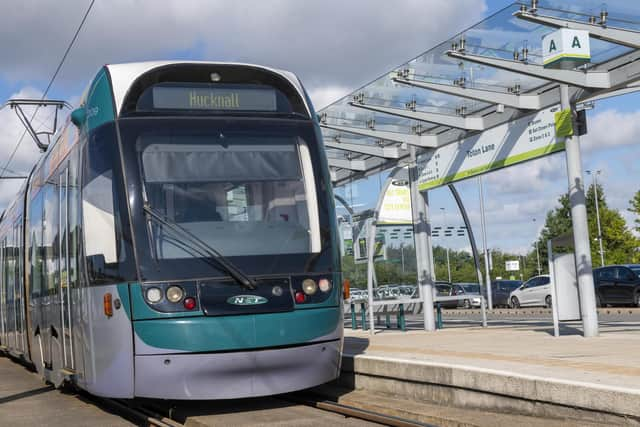Hucknall and Bulwell tram operator posts £57m loss in last year
and live on Freeview channel 276
Figures posted to Companies House show Tramlink – of which Nottingham Express Transit (NET) is part – recorded losses of £57,145,000 in the last 12 months – more than double the previous year.
And tram bosses have put part of the blame on the Department for Transport’s (DfT) £2 bus fare capping scheme, which they say makes it ‘difficult’ for trams to compete.
Advertisement
Hide AdAdvertisement
Hide AdTim Hesketh, Tramlink chief executive, said: “We live in a very difficult and competitive environment.


“Trams generally fall into a bit of a black hole with the DFT, because we are neither fish nor fowl.
“We are not buses, we are not trains, we are sort of a hybrid of the two and nobody really knows quite where we fit in DfT.
“When they start giving out cash to support public transport, it’ll either get put into trains or buses.
Advertisement
Hide AdAdvertisement
Hide Ad"There has been a lot of it dished out post-Covid and is continuing to be dished out with the £2 capped fare.
“But none of it has come to tram at all, not just in Nottingham, but every light rail system in the country is now competing with the £2 bus fare, which is very difficult.”
Bosses also blamed fare-dodgers and the rise in runing costs as other reasons for the huge losses.
Around £20m is brought in each year in revenue from ticket sales – however fare evasion is costing an estimated £2m.
Advertisement
Hide AdAdvertisement
Hide AdIt is estimated roughly eight to 10 per cent of all tram passengers are not paying a fare.
Mr Hesketh continued: “We’ve had a very high profile zero tolerance campaign leading up to Christmas and that will continue for the foreseeable future.”
NET also says the Covid pandemic and Russia’s invasion of Ukraine have also had an adverse effect on the network.
Before the invasion, energy bills for the network had been £3.5m.
Advertisement
Hide AdAdvertisement
Hide AdHowever, at the height of the energy crisis, costs increased to almost £15m – a near 500 per cent rise.
They now sit at around £6m per year.
As a result of its financial woes, the tram recently restructured its loans amid financial difficulties, citing increased costs and lower passenger numbers following the pandemic.
Fare rises also came into force across the board this week.
But David Thornhill, chair of the Nottinghamshire Campaign for Better Transport, says he feels the new prices may dissuade people from using the trams, particularly when there is a cheaper alternative in the buses.
He added: “Tram operators, not just in Nottingham, have pointed out they are suffering due to Covid and the £2 bus fare and the Government has been ignoring them.
“They ought to have taken the tram into consideration.”
Advertisement
Hide AdAdvertisement
Hide AdThe DfT says between March 2020 and October 2022, the Government provided around £34 million to support NET in pandemic-related subsidy,
A spokesperson said: “While we recognise the importance of trams for communities, light rail is devolved in Nottingham and local authorities are ultimately responsible for the financial sustainability of their systems.”